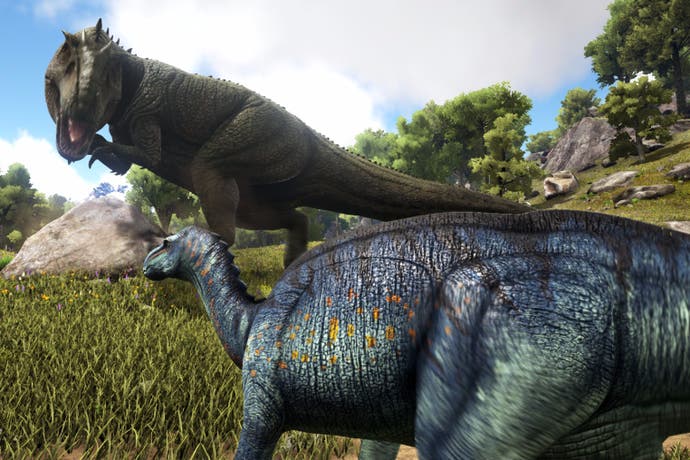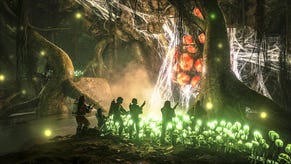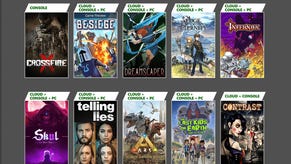How Ark survived Steam Early Access
Studio Wildcard on DLC controversy, lawsuits and PR disasters.
Towards the end of 2014, Jeremy Stieglitz and Jesse Rapczak knew they wanted to make a game together. "It was just Jesse and me in the beginning. You don't set out as 'let's build a team and make a game but we don't have an idea for a game'. It was quite the opposite," Stieglitz says. The team they built would soon be known as Studio Wildcard, and even though they didn't know it yet, they were about to run one of the most successful Early Access campaigns ever for a game called Ark: Survival Evolved.
At the time, the survival genre was enjoying a renaissance. DayZ and Rust had primed the market to explode. "We are developers but also had to be business people," says Stieglitz. "We looked at the major titles including Rust at the time - and by the way Rust is a fantastic game - and felt it did certain things well, like good gunplay for PvP, but then it didn't have other things people would want to see, such as solid PvE, really owning the world, making it a little more homey and, particularly, no real creature aspects."
That focus on creature aspects was Studio Wildcard's golden ticket. "We felt there was some indication dinosaurs would be appealing" Stieglitz says. "I'll be honest, we took a look at the flameout of a game called Stomping Grounds, and how it did pretty well but was a flawed game for what it was. That indicated people really wanted to play a decent dinosaur game but they didn't have one yet."
And the rest, as they say, is history. Ark: Survival Evolved, a PvE and PvP survival game set in a world with dinosaurs and other fantastical creatures, was born. And it was a hit. The game procured an eager fanbase, making $10m in sales in its first week and selling one million copies in its first month. As of June this year, the player count for the game had reached nine million. As Studio Wildcard continued to build and improve its game with a steady stream of updates, players flocked to the title.
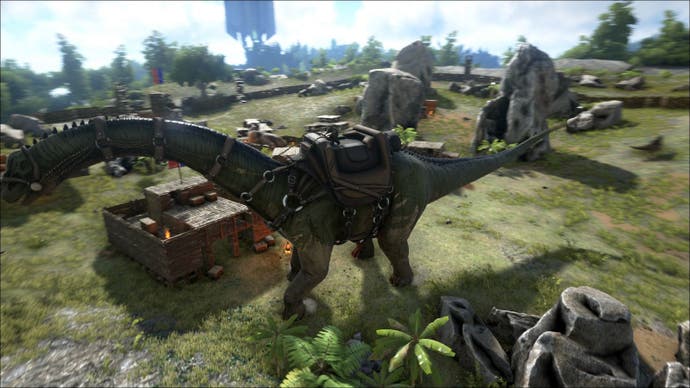
With the confidence of a having a massive release behind it, Studio Wildcard saw room to expand into a new area. "Heh. Well, Survival of the Fittest of course is a sad story, but you know, sometimes good stories are sad stories," laments Stieglitz.
Before the monster success of PlayerUnknown's Battlegrounds, the arena-based survival genre was still in its infancy, waiting for the spark to ignite it. Arma, DayZ and H1Z1 had popular mods that revolved around 'Battle Royale' play, and it was clear someone was going to make the breakout hit sometime soon. Studio Wildcard thought Ark might be just the franchise to do it. Handled by Instinct Games, Ark: Survival of the Fittest was spun off in March 2016. Based on an internal mod made with the game's dev kit, Survival of the Fittest was broken out as its own free to play game and even had broadcasted tournaments. Suddenly Ark, the Early Access survival game, was an esport.
It didn't take off.
"It all kind of worked, but for a thousand different reasons, it just didn't catch on," Stieglitz says. "The mod seemed popular, the market seemed ready for a game like that. PlayerUnknown's Battlegrounds and King of the Kill show there is a big market. I don't know if there's a lot of room now for a game like that, but certainly then there might have been."
After the initial push, the game's player base dropped off. With Instinct as leads, Survival of the Fittest never detracted from the development of Survival Evolved, but it proved to be a failed experiment. "We've had some internal post-mortems," Stieglitz explains. "One reason [it didn't catch on] might be the game was slow paced compared to PUBG or KotK. Those are very much 30-40 minute games. The real meat of SotF was more like 90 minutes. It was also much more complicated. You couldn't just drop in, get a gun and start killing people and enjoy the visceral aspect easily." Eventually the spin-off was integrated back into the main Ark game.
On the future of the spin-off, Stieglitz admits there may be hope, but it isn't looking good. "I think eventually we will have to sunset it, but we want to take stock of it after Survival Evolved releases and see if there is any way to give it a second lease on life."
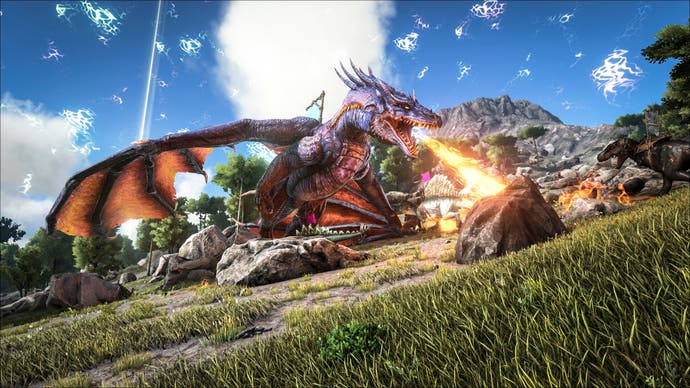
While Survival of the Fittest was a creative loss, Studio Wildcard had a more serious problem to deal with, one that had been brewing since the studio's inception and threatened to delete the entire game's success overnight.
Before Stieglitz officially founded Studio Wildcard, he had founded another company, the Florida-based Trendy Entertainment in 2009 and worked on a title called Dungeon Defenders. In 2012, Trendy was sold to Insight Venture Partners. "One of the things I realised is when you sell your company to venture capitalists, it's a very specific type of individual," Stieglitz says.
"They're not interested in game development. VCs are interested in one thing: a big money exit. They don't really care what it takes to get to A to B. It's just what's the multiplier going to be when they leave.
"It [Trendy] ceased to be a game developer and instead became a money enterprise. It's not about the game anymore it's just about what's going to go the highest rate of interest in the long term. The decisions started to be to go free to play, go heavy monetisation. They wanted me to make a MOBA. It was just really, really not pleasant. I wasn't happy there. I was not at my A game. I was really unhappy. I think that rubbed off on people I was working with."
It's worth noting Stieglitz came under fire after a Kotaku exposé which alleged Trendy was a nightmare workplace and Stieglitz "a dictatorial manager who publicly berates his staff". Stieglitz left the company at that point, and that's where the legal trouble started.
"These guys being really hard driving VCs, they had me locked up with a crazy, super long contract," Stieglitz says.
"They were like, 'you'll never make a game for the rest of your life, enjoy!' type thing." Despite this obstacle, Studio Wildcard's founders looked at the contract and spotted what they thought were frailties. So, they went ahead and built Ark. "Were we being too clever by half? I don't know," Stieglitz says. "They are pretty clever guys on their end, or they wouldn't have had me locked up in a zillion year contract."
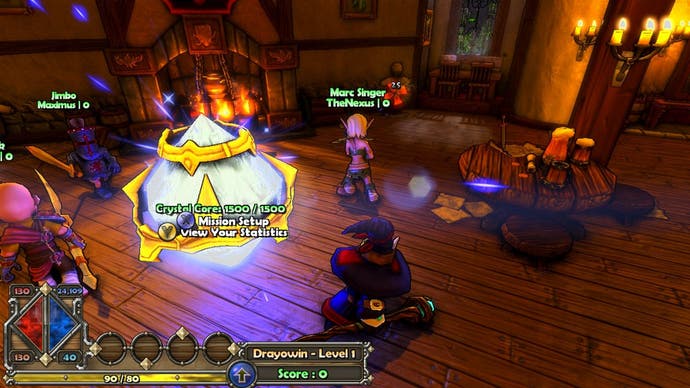
Trouble arose after Ark's near instant success. "I'm sure their eyes lit up with dollar signs at that point. That was their way out. That was their way of making a zillion bucks." Studio Wildcard was then hit with a lawsuit accusing Stieglitz of breaching his non-compete agreement, taking Trendy employees with him and of secretly working on Ark when he shouldn't have been. "It's important to keep in perspective, this isn't Trendy really. Trendy is a small team. It's the money guys that own them that were coming at us." Stieglitz insists. "They were threatening to crush us. Crush Ark. Crush everything they could get their hands on."
Development on Ark became even more complicated. "To some extent, they knew their argument was weak, but, their goal was, regardless of the strength of their legal argument, to just make our daily lives hell. That would include things like going for injunction after injunction after injunction."
Stieglitz claims Trendy would try to "get a quick, legal snap judgement that we would have to shut down our servers, or I wouldn't be able to work, or we had to let go all of our employees".
"They would try every single day to get a judge somewhere, who was not really familiar on the details of the case yet, to just sign off. Their argument was Ark's existence was harming Dungeon Defenders. Like... how would you even justify that? Why would Ark being online cause Dungeon Defenders to lose players? The games aren't even remotely similar! But to a judge who doesn't know anything about video games, they might sign off, and when they couldn't get one judge to do it, they would go to a different judge, in a different forum to try and get a similar judgement."
Stieglitz also claims the lawsuit was punishingly disruptive. "Basically, every single day they asked us for thousands more documents. You know, 'what are all your emails? What is all your source code? What's all your Skype chats? What are all your Slack chats? What are all your text messages? You'd give them a thousand documents and the next day, we'd have a thousand more document requests."
According to Stieglitz, Studio Wildcard settled (reportedly for $40m) in April 2016 for the good of the game and the company. "It was like, we can deal with that or we could do games. We just couldn't do both at the exact same time. So we made a decision. That was tough, but it was in the long-term interest of the title, and frankly, probably our own sanity, which was to settle and get back to the real thing we like doing everyday which was making games."
"The general rule is, if someone is not suing you, you can't consider yourself successful, right?" Rapczak jokes. "It was a tough time. The team was small from the beginning. All of us have worked together for decades at previous companies, we'd known each other for a really long time.
"At the end of the day, it was the right choice to get this behind us so we could refocus on games."
(After the settlement, a Trendy spokesperson issued the following statement to The Gainseville Sun: "Trendy is pleased that Studio Wildcard and Jeremy Stieglitz chose to quickly resolve the claims against them. Mr. Stieglitz and Studio Wildcard made very substantial restitution to the parties that invested in Trendy. Obviously Mr. Stieglitz and Studio Wildcard realised the very serious nature of these claims, and we are happy that this matter has now been appropriately resolved.")
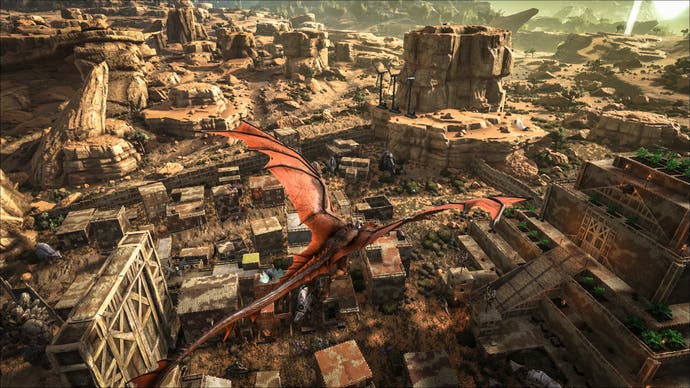
With the messy legal tussle behind Studio Wildcard, Ark continued to grow steadily and add content. Every month or so, players would have new dinos, new equipment and small improvements to play with. Things were going well - so well that Studio Wildcard made a bold decision, one that in hindsight was perhaps an overreach.
Despite Ark still being in Early Access, Studio Wildcard announced Scorched Earth, a paid expansion DLC for the main game. This would see the addition of a new desert-based map which was home to 11 new creatures and over 50 new items.
Rapczak explains: "Scorched Earth is something that took a long time for us to develop internally but we felt it was important to create more content for players who had been playing the game for over a year at that point. Sure, we would have official mods that we would create, like The Center and Primitive Plus, and bring some of that to console players, but it's important to remember the console players don't have this same amount of variety that the PC players do."
Of course, a lot of players weren't happy about the release. While it added a fair amount of content, the idea of swallowing a £14.99 DLC for a game not yet out was a bitter pill for some. Studio Wildcard took a PR punch to the face.
"We didn't anticipate how it would be viewed," Stieglitz admits. "In hindsight, we would never do that again. I would never do that in Early Access again and I wouldn't recommend any developer do it either. I won't mince words with that. I don't think from a business standpoint it was worth it. I do think from a technical standpoint, it was, you might say, necessary."
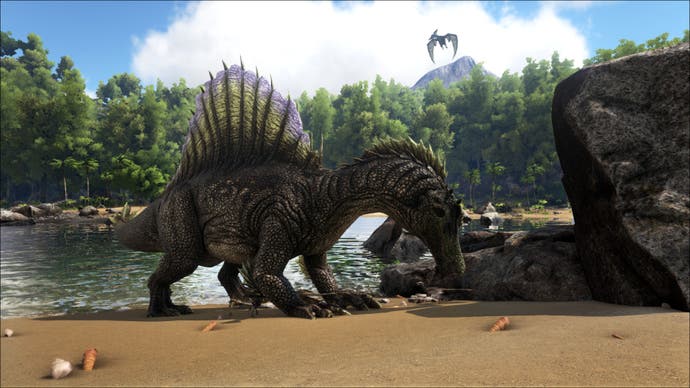
While PC players expressed their distaste at Scorched Earth's very existence, the expansion did provide much-needed content for console players, who had by this point become a significant portion of Ark's audience. In December 2015, the game made its console debut on Xbox One. By August 2016, it had sold 1.5m copies on the platform.
"We submitted the game concept right when we started working on the game because we knew we were going to go to consoles eventually," says Rapczak. "The interesting thing was we had planned to do that after we left Early Access, but then Microsoft started the Xbox Game Preview program around E3 of the year we launched." This opened Ark up to a huge new audience who were eager to jump into the game. "It made instant sense that we needed to do Game Preview so we could get the same type of feedback we had on PC. The decision to go to console quickly was an easy one once it was available to us."
However, there was now a glaring omission: PlayStation 4. PS4 didn't have an early access program - not officially, anyway - but demand for Ark on the console continued to flood in. Eventually, Studio Wildcard publicly called out Sony, saying in a post on its forum forum: "We would like nothing more than to make Ark available on PS4 as soon as possible, as we already have an awesome PS4 version of the game running internally. If you would like to see it sooner, please let Sony know, as it's unfortunately not our decision."
It seems fans did indeed let Sony know. Ark came out on PS4 just four months later in December 2016, a move that unofficially launched early access on the console.
"Sony probably saw how successful it was on Xbox. I wouldn't say Sony changed their policy but... 'bend it, not break it' is how they probably viewed it," explains Stieglitz.
"Effectively what they required of us on PS4 was we meet all their technical certification requirements to release as a full title. We had a list of 150 or so test cases that every game shipping on PS4 has to do. We had to be what could be considered a full shipping title even though we knew there was still a lot of content that would be added to it.
"They didn't cancel their technical requirements or even relax them. They just said, 'you know what, if you want to add content to the game after this point, you are welcome to do so and if you want to say on our store and on our website that the game will still get a lot of content added to it with a lot of updates, that's fine with us as well, but as long as you meet these full shipping requirements, then we can consider it a retail title.' We appreciate Sony doing that."
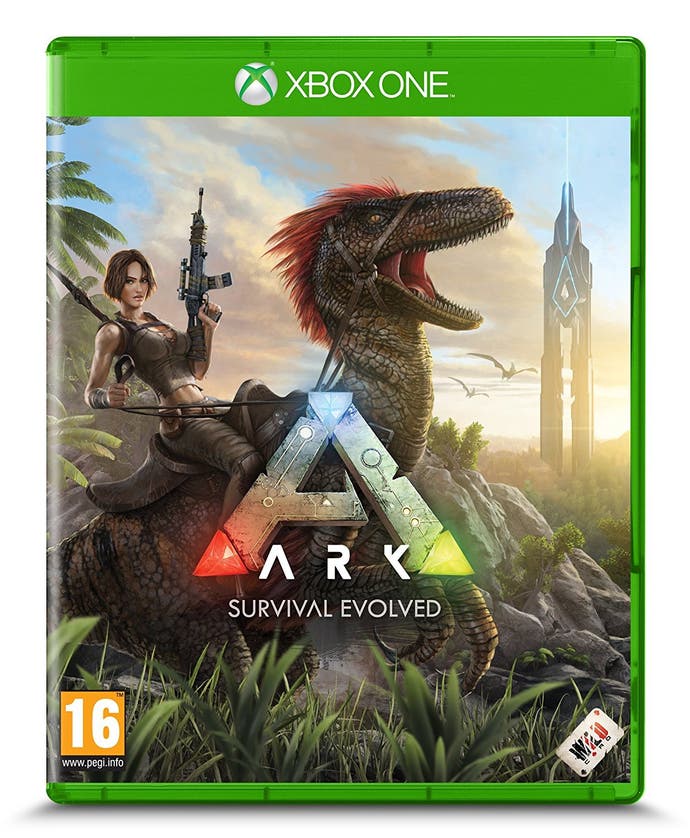
While the console version proved important to Ark, it recently caused a PR nightmare for the developers. Studio Wildcard had decided Ark should see a boxed release to coincide with the full launch of the game - Ark on shop shelves, complete with Special Editions, would expose the game to an even bigger audience who might not have known it existed, a more casual audience who might be pulled in by that lovely dinosaur-flavoured box art. The Steam Early Access hit was now coming to bricks and mortar.
There was a problem, though. Retailers wouldn't stock Ark on their shelves unless the game saw price parity with the digital version. Last month, this saw the game jump from £24.99 to £49.99. While it's common for a game to see a price increase as it leaves Early Access, this was a huge double jump that came weeks before the planned release date - and the gaming community was not happy. Dean Hall, creator of the DayZ mod that preceded Ark in the survival genre, called the price hike "fucking outrageous".
"That one is kind of a planning blindspot," admits Stieglitz. "We didn't realise in order to get to retail on store shelves they would require price parity with digital, not on launch day, but prior to launch day. That was... 'well we need it now because we have to do a pre-order campaign'. We were faced with a very stark decision at that point."
Studio Wildcard decided to stick with the retail release and take the inevitable backlash from the community.
"We tried to communicate it in advance as fast as we could, but we didn't have as much lead time as we would have liked. We only found out a few weeks before it had to happen. You know, ultimately, it sucked. We do think now, as we get to release, we absolutely feel there is a great $60 game there. The value is there."
After all that, the clashes with fans over DLC and price, a failed esport venture, a lawsuit that threatened to shut the game down and convincing Sony to sort of get into PS4 early access, Ark launches proper today. The road to release was not smooth. Ark, despite all of its players and success, is still seen as a controversial title, one sporting 'mixed' reviews on Steam. From optimisation troubles to the aforementioned controversies, Ark's evolution has been complex and fascinating. The game and its developers grew from small beginnings to a now huge franchise quickly, which inevitably came with growing pains. At the root of Ark's story so far is a difficult question: what's the right way to do early access?
Studio Wildcard hasn't always got the answer to that question right, but Ark remains one of the most-played games on Steam, with many fans having clocked thousands of hours. For some, Ark is a hobby. That doesn't happen by accident. In a world where three out of four Early Access games never make it to full release, Ark has soldiered on to the finish line.
"One of the things I'm most proud of with Ark," Stieglitz declares, "is we came out in June 2015 with a certain set of goals - and we've hit every single one of them."
